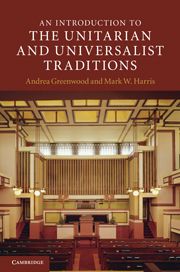Book contents
- Frontmatter
- Contents
- Acknowledgements
- A note on names
- Chapter 1 Introduction
- Chapter 2 Beginnings
- Chapter 3 Great Britain
- Chapter 4 From revelation to reason
- Chapter 5 From reason to intuition to freedom
- Chapter 6 A religion for one world
- Chapter 7 Congregational polity
- Chapter 8 Worship
- Chapter 9 Sources of faith
- Chapter 10 Science and ecology
- Chapter 11 Architecture, art, and music
- Chapter 12 Education and social justice
- Chapter 13 Current issues, new directions
- Selected bibliography
- Index
- References
Chapter 4 - From revelation to reason
America 1630–1833
Published online by Cambridge University Press: 05 June 2012
- Frontmatter
- Contents
- Acknowledgements
- A note on names
- Chapter 1 Introduction
- Chapter 2 Beginnings
- Chapter 3 Great Britain
- Chapter 4 From revelation to reason
- Chapter 5 From reason to intuition to freedom
- Chapter 6 A religion for one world
- Chapter 7 Congregational polity
- Chapter 8 Worship
- Chapter 9 Sources of faith
- Chapter 10 Science and ecology
- Chapter 11 Architecture, art, and music
- Chapter 12 Education and social justice
- Chapter 13 Current issues, new directions
- Selected bibliography
- Index
- References
Summary
The winding pathway from the belief in total human depravity that characterized Calvinism to the free will espoused by the Unitarians can be found in developments within Puritan faith and culture. While the first settlers in America after 1630 ascribed to a faith in salvation by grace, these immigrants also included opportunistic capitalists who wanted to prove their own worth by succeeding in business. Many of those who found the secular life more appealing decided that a liberal faith placing fewer theological demands upon them was more congenial to this world rather than the next. Edward Johnson, a wealthy Puritan, reported, “our maritime towns began to increase roundly.” The prosperity of this “place of Merchandize” was a sign that God favored them, and this made worldliness more and more appealing.
The context for the development of a frugal, industrious, and ultimately successful life was within the confines of the local community where each Puritan church was gathered. A Puritan desire for more local and simple forms of worship was stated by Cotton Mather: “we would worship God without that Episcopacy, that common-prayer, and those unwarrantable ceremonies, with which the land of our fore fathers sepulchres has been defiled; we came because we would have our posterity settled under the pure dispensations of the gospel, defended by rulers that should be of ourselves.” The Puritans agreed that individual churches had the “power to choose their officers and ministers.” Self-rule, an aspect of Puritan life that fomented the growth of a Unitarian tradition, was codified in the Cambridge Platform of 1648 as “a scriptural model of church government.”
- Type
- Chapter
- Information
- Publisher: Cambridge University PressPrint publication year: 2011

